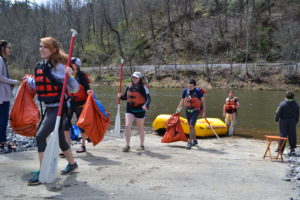
Students returning with the trash they collected during the Tuck river Cleanup 2017. Photo by Kristie Watkins.
The tradition just keeps flowing on as one of the nation’s largest annual single-day river cleanup of the is back in Cullowhee on Saturday, April 13. For the 35-th year, volunteers are ready to take on this adventure.
The clean-up covers 20 miles of the Tuckasegee River starting in entry points at Cullowhee Dam, Dillsboro River Company, and Locus Creek. The long adventure down the river ends in Whittier, NC when the volunteers are taken back to WCU’s campus.
The registration for Tuck River Cleanup will be on the UC Lawn by the clock tower starting at 8 a.m. and noon for the second round of rafters. Not all who participate have to raft. There is an option to sign up at 10 a.m. to walk the provided route. There will be a 300-volunteer cap per registration time for rafting and a 30-volunteer cap for those walking.
This is an event that many students look forward to every year and are sure to wake up early enough to participate.
Taylor Martin, a graduating senior, who participated in the event last year, recommends it as a good way to have fun and make friends.
“Participating in the Tuck River Cleanup provided me a unique way to help the local community and meet new people,” Martin said.
According to the Tuck River Cleanup page, the first 500 volunteers signed up will receive a free t-shirt. All supplies are provided by Base Camp who is in charge of the event every year. They provide transportation to the rafting entrance or walking entrance for the volunteers that sign-up. They also provide gear like a life jacket, raft, trash bags, and gloves.
The Tuck River Cleanup page provides a list of requirement for those who are wanting to raft. These requirements cover things such as: you have to be over 40 pounds to participate; listing of clothes to wear and not to wear; what is provided; a need to wear floating devices; and to make sure you are active on your journey.
In the past, about 3 to 5 tons of trash have been collected by the volunteers that have rafted or walked the Tuck River. This clean-up is providing a safer water source since Sylva and local communities depend on the Tuck River.


